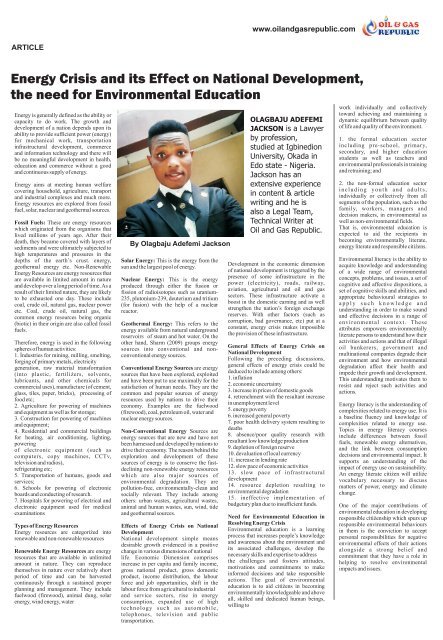Middle East Electricity & Solar 2017
Oil & Gas Republic is an exhibitor & media partner at Middle East Electricity & Solar 2017. This Newspaper publication is a spotlight on the Middle East Electricity & Power Sector. Middle East Electricity is an essential event in the MEA power community’s calendar, and the 2017 edition will be an unmissable opportunity for anyone with a professional interest to learn about the future of energy in cities. Informa Exhibitions is the organizer of Middle East Electricity & Solar 2017, one of the world’s leading power exhibitions. For more information, visit http://oilandgasrepublic.com
Oil & Gas Republic is an exhibitor & media partner at Middle East Electricity & Solar 2017. This Newspaper publication is a spotlight on the Middle East Electricity & Power Sector. Middle East Electricity is an essential event in the MEA power community’s calendar, and the 2017 edition will be an unmissable opportunity for anyone with a professional interest to learn about the
future of energy in cities. Informa Exhibitions is the organizer of Middle East Electricity & Solar 2017, one of the world’s leading power exhibitions. For more information, visit http://oilandgasrepublic.com
You also want an ePaper? Increase the reach of your titles
YUMPU automatically turns print PDFs into web optimized ePapers that Google loves.
www.oilandgasrepublic.com<br />
ARTICLE<br />
Energy Crisis and its Effect on National Development,<br />
the need for Environmental Education<br />
Energy is generally defined as the ability or<br />
capacity to do work. The growth and<br />
development of a nation depends upon its<br />
ability to provide sufficient power (energy)<br />
for mechanical work, transportation<br />
infrastructural development, commerce<br />
and information technology and there will<br />
be no meaningful development in health,<br />
education and commerce without a good<br />
and continuous supply of energy.<br />
Energy aims at meeting human welfare<br />
covering household, agriculture, transport<br />
and industrial complexes and much more.<br />
Energy resources are explored from fossil<br />
fuel, solar, nuclear and geothermal sources.<br />
Fossil Fuels: These are energy resources<br />
which originated from the organisms that<br />
lived millions of years ago. After their<br />
death, they became covered with layers of<br />
sediments and were ultimately subjected to<br />
high temperatures and pressures in the<br />
depths of the earth’s crust. energy,<br />
geothermal energy etc. Non-Renewable<br />
Energy Resources are energy resources that<br />
are available in limited amount in nature<br />
and develop over a long period of time. As a<br />
result of their limited nature, they are likely<br />
to be exhausted one day. These include<br />
coal, crude oil, natural gas, nuclear power<br />
etc. Coal, crude oil, natural gas, the<br />
common energy resources being organic<br />
(biotic) in their origin are also called fossil<br />
fuels.<br />
Therefore, energy is used in the following<br />
spheres of human activities:<br />
1. Industries for mining, milling, smelting,<br />
forging of primary metals, electricity<br />
generation, raw material transformation<br />
(into plastic, fertilizers, solvents,<br />
lubricants, and other chemicals for<br />
commercial uses), manufacture (of cement,<br />
glass, tiles, paper, bricks), processing of<br />
food etc;<br />
2. Agriculture for powering of machines<br />
and equipment as well as for storage;<br />
3. Construction for powering of machines<br />
and equipment;<br />
4. Residential and commercial buildings<br />
for heating, air conditioning, lighting,<br />
powering<br />
of electronic equipment (such as<br />
computers, copy machines, CCTv,<br />
television and radios),<br />
refrigerating etc;<br />
5. Transportation of humans, goods and<br />
services;<br />
6. Schools for powering of electronic<br />
boards and conducting of research.<br />
7. Hospitals for powering of electrical and<br />
electronic equipment used for medical<br />
examinations<br />
Types of Energy Resources<br />
Energy resources are categorized into<br />
renewable and non-renewable resources<br />
.<br />
Renewable Energy Resources are energy<br />
resources that are available in unlimited<br />
amount in nature. They can reproduce<br />
themselves in nature over relatively short<br />
period of time and can be harvested<br />
continuously through a sustained proper<br />
planning and management. They include<br />
fuelwood (firewood), animal dung, solar<br />
energy, wind energy, water<br />
By Olagbaju Adefemi Jackson<br />
<strong>Solar</strong> Energy: This is the energy from the<br />
sun and the largest pool of energy.<br />
Nuclear Energy: This is the energy<br />
produced through either the fusion or<br />
fission of radioisotopes such as uranium-<br />
235, plutonium-239, deuterium and tritium<br />
(for fusion) with the help of a nuclear<br />
reactor.<br />
Geothermal Energy: This refers to the<br />
energy available from natural underground<br />
reservoirs of steam and hot water. On the<br />
other hand, Sharm (2009) groups energy<br />
sources into conventional and nonconventional<br />
energy sources.<br />
Conventional Energy Sources are energy<br />
sources that have been explored, exploited<br />
and have been put to use maximally for the<br />
satisfaction of human needs. They are the<br />
common and popular sources of energy<br />
resources used by nations to drive their<br />
economy. Examples are the fuelwood<br />
(firewood), coal, petroleum oil, water and<br />
nuclear energy sources.<br />
Non-Conventional Energy Sources are<br />
energy sources that are new and have not<br />
been harnessed and developed by nations to<br />
drive their economy. The reason behind the<br />
exploration and development of these<br />
sources of energy is to conserve the fastdeclining<br />
non-renewable energy resources<br />
which are also major sources of<br />
environmental degradation. They are<br />
pollution-free, environmentally-clean and<br />
socially relevant. They include among<br />
others: urban wastes, agricultural wastes,<br />
animal and human wastes, sun, wind, tide<br />
and geothermal sources.<br />
Effects of Energy Crisis on National<br />
Development<br />
National development simple means<br />
desirable growth evidenced in a positive<br />
change in various dimensions of national<br />
life. Economic Dimension comprises<br />
increase in per capita and family income,<br />
gross national product, gross domestic<br />
product, income distribution, the labour<br />
force and job opportunities, shift in the<br />
labour force from agricultural to industrial<br />
and service sectors, rise in energy<br />
consumption, expanded use of high<br />
technology such as automobile,<br />
telephones, television and public<br />
transportation.<br />
OLAGBAJU ADEFEMI<br />
JACKSON is a Lawyer<br />
by profession,<br />
studied at Igbinedion<br />
University, Okada in<br />
Edo state - Nigeria.<br />
Jackson has an<br />
extensive experience<br />
in content & article<br />
writing and he is<br />
also a Legal Team,<br />
Technical Writer at<br />
Oil and Gas Republic.<br />
Development in the economic dimension<br />
of national development is triggered by the<br />
presence of some infrastructure in the<br />
power (electricity), roads, railway,<br />
aviation, agricultural and oil and gas<br />
sectors. These infrastructure activate a<br />
boost in the domestic earning and as well<br />
strengthen the nation’s foreign exchange<br />
reserves. With other factors (such as<br />
corruption, bad governance, etc) put at a<br />
constant, energy crisis makes impossible<br />
the provision of these infrastructure.<br />
General Effects of Energy Crisis on<br />
National Development<br />
Following the preceding discussions,<br />
general effects of energy crisis could be<br />
deduced to include among others:<br />
1. inflation<br />
2. economic uncertainty<br />
3. increase in prices of domestic goods<br />
4. retrenchment with the resultant increase<br />
in unemployment level<br />
5. energy poverty<br />
6. increased general poverty<br />
7. poor health delivery system resulting to<br />
deaths<br />
8. absence/poor quality research with<br />
resultant low knowledge production<br />
9. depletion of foreign reserve<br />
10. devaluation of local currency<br />
11. increase in lending rate<br />
12. slow pace of economic activities<br />
13. slow pace of infrastructural<br />
development<br />
14. resource depletion resulting to<br />
environmental degradation<br />
15. ineffective implementation of<br />
budgetary plan due to insufficient funds.<br />
Need for Environmental Education in<br />
Resolving Energy Crisis<br />
Environmental education is a learning<br />
process that increases people’s knowledge<br />
and awareness about the environment and<br />
its associated challenges, develop the<br />
necessary skills and expertise to address<br />
the challenges and fosters attitudes,<br />
motivations and commitments to make<br />
informed decisions and take responsible<br />
actions. The goal of environmental<br />
education is to aid citizens in becoming<br />
environmentally knowledgeable and above<br />
all, skilled and dedicated human beings,<br />
willing to<br />
work individually and collectively<br />
toward achieving and maintaining a<br />
dynamic equilibrium between quality<br />
of life and quality of the environment.<br />
1. the formal education sector<br />
including pre-school, primary,<br />
secondary, and higher education<br />
students as well as teachers and<br />
environmental professionals in training<br />
and retraining; and<br />
2. the non-formal education sector<br />
i n c l u d i n g y o u t h a n d a d u l t s ,<br />
individually or collectively from all<br />
segments of the population, such as the<br />
family, workers, managers and<br />
decision makers, in environmental as<br />
well as non-environmental fields.<br />
That is, environmental education is<br />
expected to aid the recipients in<br />
becoming environmentally literate,<br />
energy literate and responsible citizens.<br />
Environmental literacy is the ability to<br />
acquire knowledge and understanding<br />
of a wide range of environmental<br />
concepts, problems, and issues, a set of<br />
cognitive and affective dispositions, a<br />
set of cognitive skills and abilities, and<br />
appropriate behavioural strategies to<br />
a p p l y s u c h k n o w l e d g e a n d<br />
understanding in order to make sound<br />
and effective decisions in a range of<br />
environmental context. These<br />
attributes empowers environmentally<br />
literate persons to understand how their<br />
activities and actions and that of illegal<br />
oil bunkerers, government and<br />
multinational companies degrade their<br />
environment and how environmental<br />
degradation affect their health and<br />
impede their growth and development.<br />
This understanding motivates them to<br />
resist and reject such activities and<br />
actions.<br />
Energy literacy is the understanding of<br />
complexities related to energy use. It is<br />
a baseline fluency and knowledge of<br />
complexities related to energy use.<br />
Topics in energy literacy courses<br />
include differences between fossil<br />
fuels, renewable energy alternatives,<br />
and the link between consumption<br />
decisions and environmental impact. It<br />
supports an understanding of the<br />
impact of energy use on sustainability.<br />
An energy literate citizen will utilize<br />
vocabulary necessary to discuss<br />
matters of power, energy and climate<br />
change.<br />
One of the major contributions of<br />
environmental education in developing<br />
responsible citizenship which spurs up<br />
responsible environmental behaviours<br />
in them is the conviction to accept<br />
personal responsibilities for negative<br />
environmental effects of their actions<br />
alongside a strong belief and<br />
commitment that they have a role in<br />
helping to resolve environmental<br />
impacts and issues.















